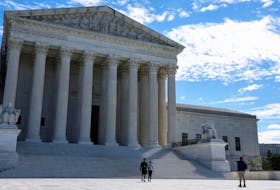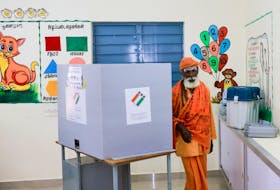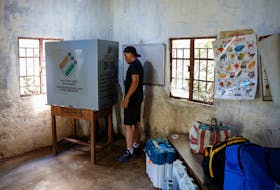It doesn’t seem that long ago for Christine Harris that she was watching in awe as her two older brothers played baseball in the meadow near their house.
On a kid-filled Harbour Grace road known as the Pipetrack, in an area called the Bawn, she couldn’t help but notice Gord’s and Alex’s fearless ability, vigour and zest for life.
“Oh, they were something else,” the 53-year-old said of her brothers. “Two of them were pretty strong guys. ... I’ve always looked up to them.”
Years later, her admiration for her siblings reached a new level, as it was their strength and love for their little sister that would save her life.
Both brothers donated a kidney to Christine — Gord, in 1987 and Alex, earlier this month.
“They’re my two knights in shining armour,” Christine said earlier this week in a telephone interview from her home in Corner Brook, where she’s recovering from her latest surgery.
“They’re my heroes.”
Christine first developed serious kidney disease in the mid-1980s, when she was in her early 20s. It was the result of what doctors figure was an untreated case of strep throat. She finally sought medical attention after noticing severe swelling in her body.
She underwent dialysis, but the disease had progressed so much, she needed a kidney transplant.
“I was devastated,” she said, recalling the moment doctors gave her the news. “It was a scary time.”
Christine’s four siblings — Gord, Herman, Alex and Elva — were all tested as possible donor matches, but Gord, the oldest and perhaps most physically fit at the time, immediately stepped up.
“I’ve always looked out for her and I felt I should be the one to do this. I wanted to help my younger sister,” Gord said, becoming emotional during the telephone conversation from his home in St. Albert, Alta., where he’s lived for almost 20 years.
“I didn’t think twice about it. Either someone did it or else she wouldn’t make it a whole lot longer.”
The transplant surgery in Halifax in 1987 was a success.
But over time, in 2004 and 2011, pieces of Christine’s new kidney had to be surgically removed when she twice developed cancer from what doctors believed were the anti-rejection drugs. Each time, she recovered.
Thanks to the new kidney, Christine was able to live a normal, healthy life for almost three decades — well beyond the average 12- to 20-year lifespan of most transplanted kidneys.
However, in the summer of 2016, she became ill again as the kidney began to fail and she immediately underwent dialyses.
Christine needed another transplant and once again, her Harris family was quick to take action.
While her sister, Elva, 51, had been deemed to be a match, it was decided that Alex, 55, would be the donor.
But it would be more complicated this time around.
During the testing process, it was discovered Christine had developed antibodies in her blood, likely from the previous transplant. It meant her siblings were no longer matches.
“It was terrible news,” Christine said. “I didn’t know what to do then.”
The family was told about the national Kidney Paired Donor (KPD) exchange program — an interprovincial program operated collaboratively between Canadian Blood Services and Canada’s living kidney donation and kidney transplant program that pairs compatible donors with those needing transplants.
According to the Canadian Blood Services’ website, the KPD’s sophisticated matching program is run against all the pairs, including non-directed donors in the registry, to identify potential donor matches that can form pairings or chains of donor kidney exchanges.
It would mean Alex could still donate his kidney, but to someone else in the program, while Christine would receive one from someone else. In turn, they’d be helping other families benefit in the chain.
Shockingly, Christine and Alex were chosen the first time their names were entered in a draw in February.
“Oh my God, I couldn’t believe it,” Christine said. “I was really excited, but nervous.”
While the recipient information is confidential, she knew her donor was from British Columbia and would be flown to Halifax for the surgery, while Alex’s recipient was from Manitoba, where he lived.
It turned out to be a difficult surgery for Alex, who needed another operation days after when it was discovered he had internal bleeding. What would’ve been a three-day stay in hospital turned into a 12-day stay.
“It was so hard on me because I couldn’t go see him,” said Christine, who added Gord was there with him. “He couldn’t text me or call me, he was in such serious condition.”
It’s been a rough road to recovery, but Alex said he wouldn’t think twice about doing it again.
“It wasn’t a difficult decision at all,” said Alex, who lives in Shilo, Man. “Christine has always been a really outgoing person and she’s been going through this since she was 20-something years old.
“I remember seeing her in hospital just prior to her first kidney operation and she looked so frail. I didn’t want her to get like that again.”
During his recovery in hospital, Alex — a master warrant officer who is retiring from the military June 1 — received a visit from the senior brass of the Royal Regiment of Canadian Artillery to present him with a medal to commemorate his 32 years of service.
But both Gord and Alex are quick to credit Christine with showing the most bravery.
“She’s a fighter,” said Gord, 59.
“She’s well on her way to recovery, which is awesome,” Alex said. “That makes it all worth it.”
The siblings say their tight-knit family is due, in large part, to their parents Herman and Marina, recipients of the 2012 Governor General’s Canadian Caring Award. Talented musicians and singers, the couple is well known in the community for having entertained audiences at a variety of events for more than 55 years. They also had their own TV show on the Cable 9 community channel, the Harris and Harris Jamboree.
“Like every other family, we have our ups and down, but overall we have a pretty phenomenal family,” Alex said. “We look after each other.”
Alex plans to move back home this summer to help his aging parents, but he’s also planning a moose hunting trip with Christine for the first time.
“I can’t wait,” Christine said.
Gord also plans a visit home this summer.
“I just can’t say enough about my brothers and my family for all they’ve done,” Christine said. “I’m certainly lucky because not everyone would do what they did for me.”
Twitter: TelyRosie
More organ, tissue donors needed
The Telegram
Most Canadians support the idea of organ and tissue donation — up to 95 per cent — yet less than half are registered donors, according to Eastern Health.
“An organ or tissue transplant can provide a new beginning,” it states on its website regarding organ donation.
It says many people in this province are in need of a transplant, which can save their lives, but several are left waiting.
“Your decision to become an organ donor can change the lives of up to eight people,” it states.
There is no age limit for organ donation. Organs such as kidneys, heart, lungs, liver pancreas and small bowel can be donated. In some provinces, tissues such as corneas, skin, heart valves, bone, veins, cartilage, tendons and ligaments can be donated, the website states.
To become an organ donor, residents of this province can indicate “Intent to Donate” organs and tissues by completing a Medical Care Plan (MCP) application or renewal form. “Organ Donor” will appear on your MCP card, which indicates your intent to donate after death.
To become a living donor, contact the Kidney Transplant Program at 777-3601 (eastern, central and Labrador regions) at 637-5000, ext. 6190 (western region).
Source: Eastern Health website








